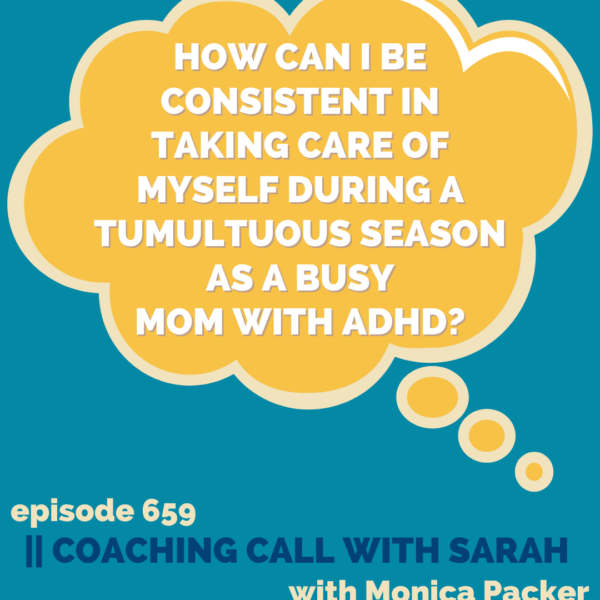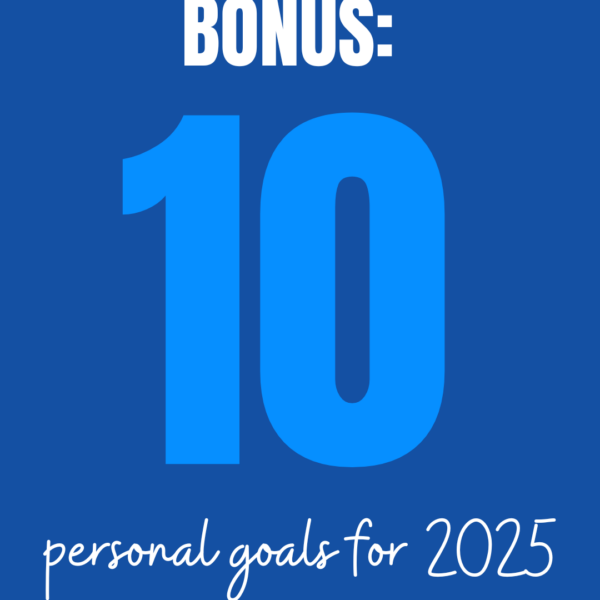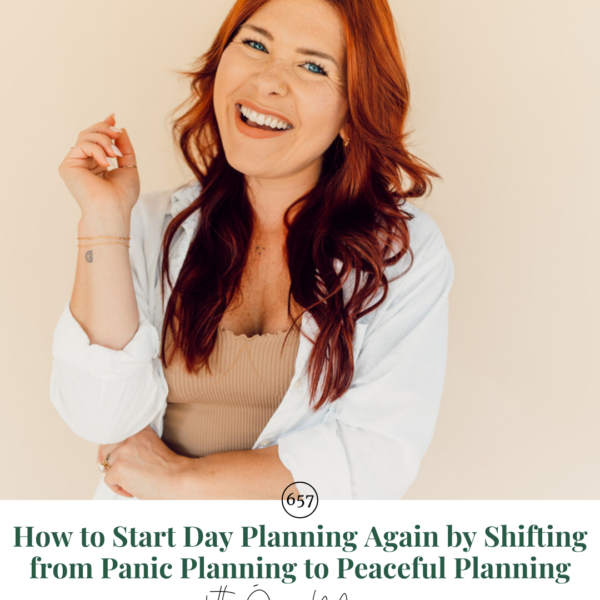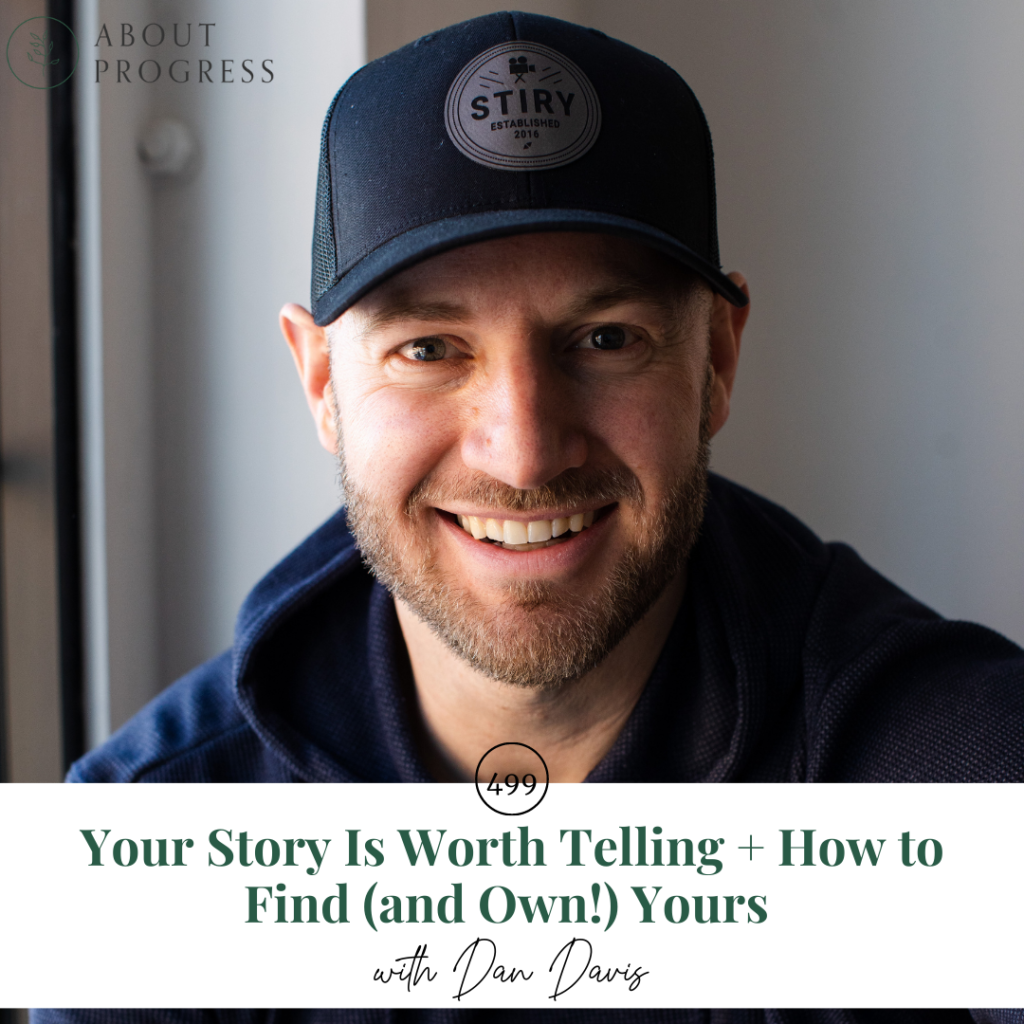
Do you have an inner critic telling you that your story is too dumb to matter? Maybe you even have outer critics that make your story feel unimportant. Those things are just not true. Dan Davis joins me in this episode to help you see that you don’t have to hit a certain level of drama or prestige to have a story worth telling.
Dan Davis is a film producer and director, and founder of the documentary film company Stiry. I was personally so impressed by his work on the documentary about my beautiful friend Kim White who passed away after a years-long fight with cancer. Dan believes that everyone has a story worth uncovering, and worth sharing. Through his own personal experience of a difficult health story he found community, support, and purpose in sharing his struggles. Learn what he thinks the first step towards discovering your story is, and why it can propel you forward in your growth.
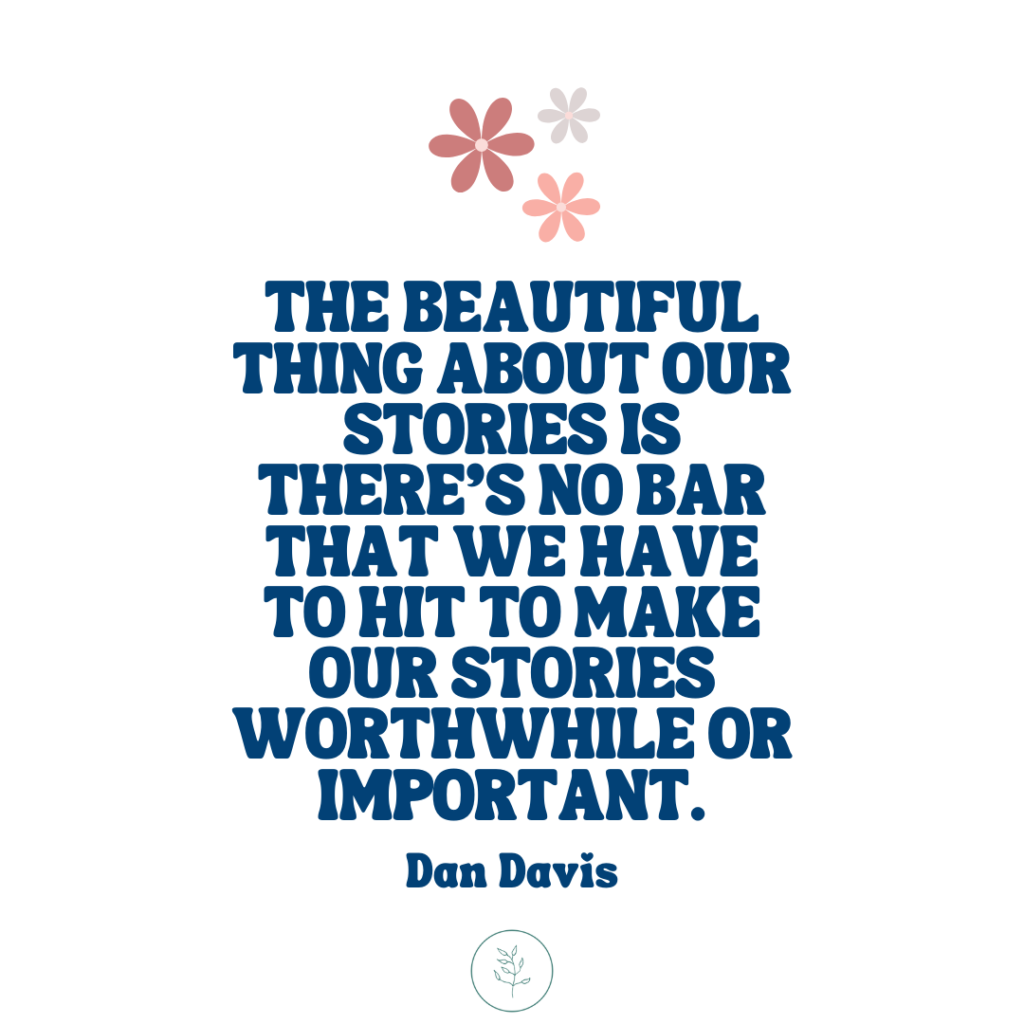
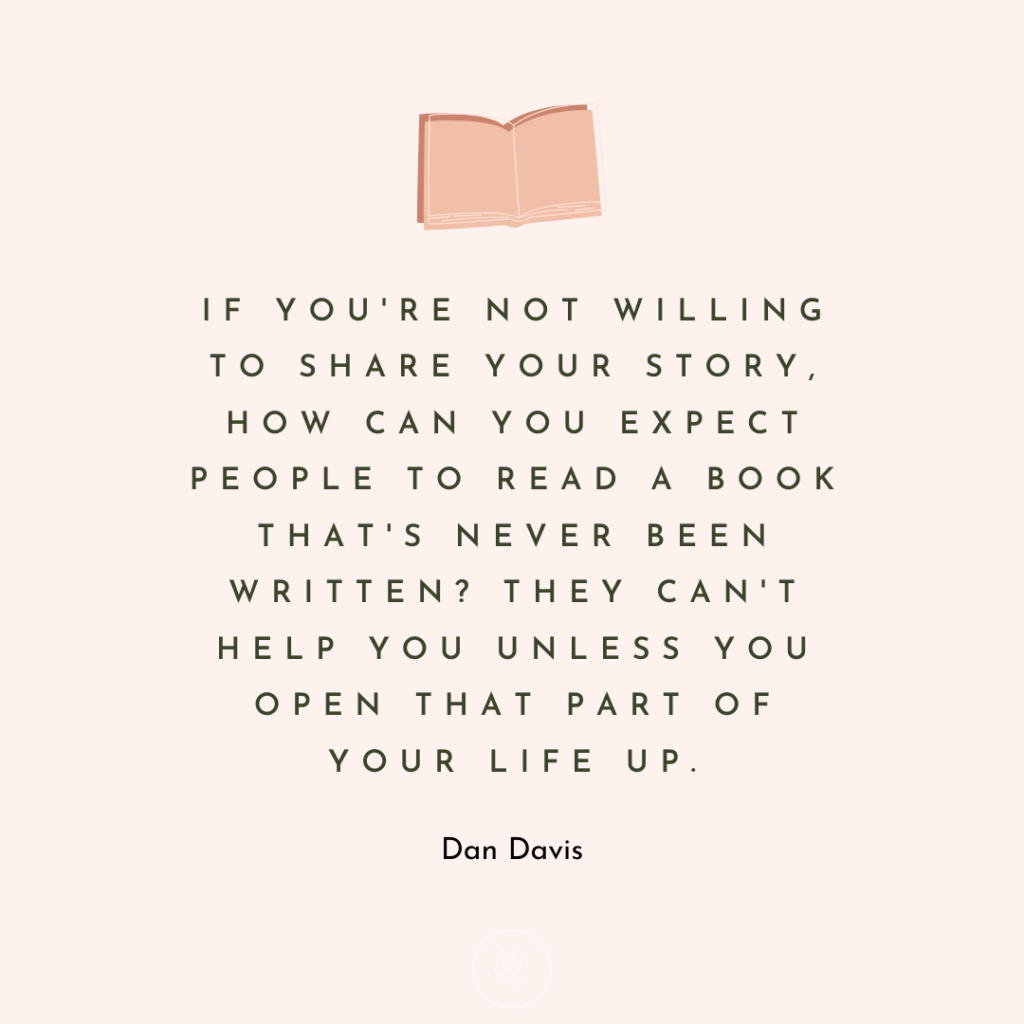
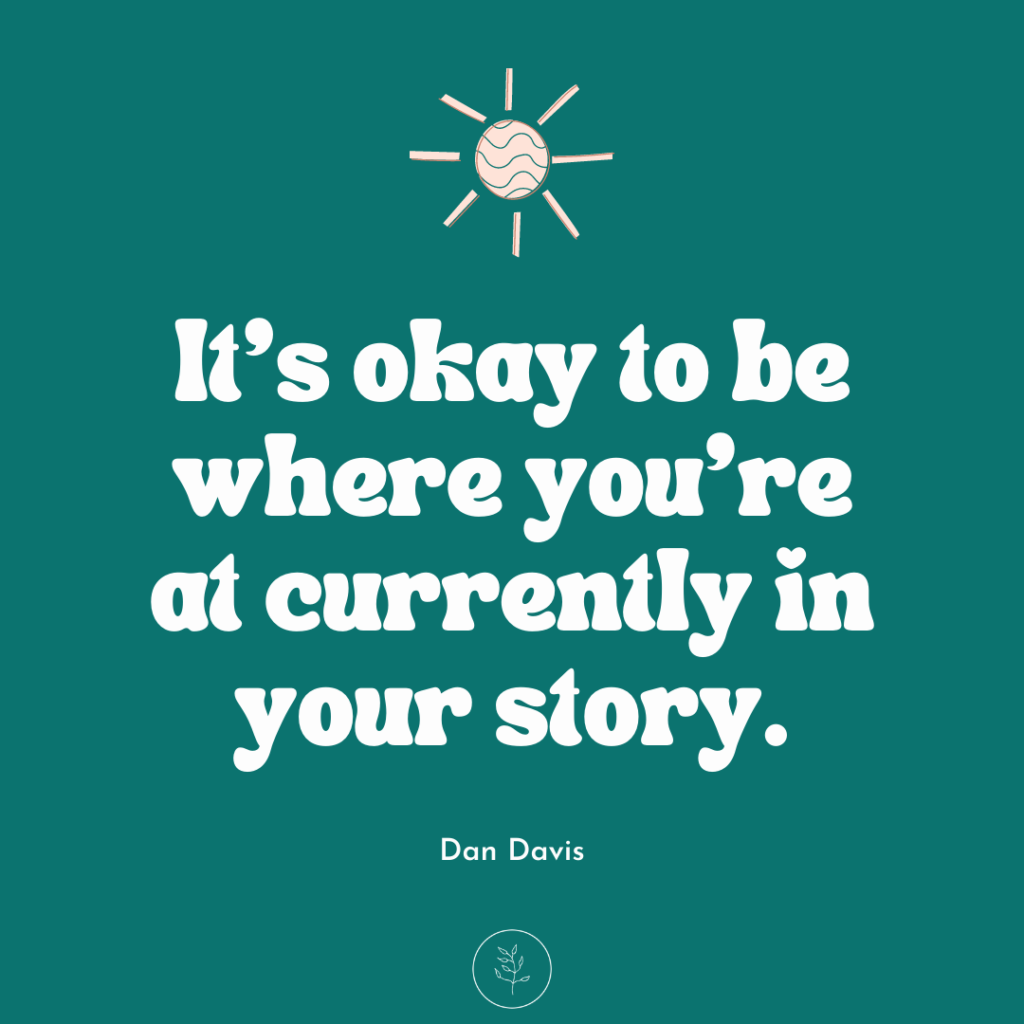
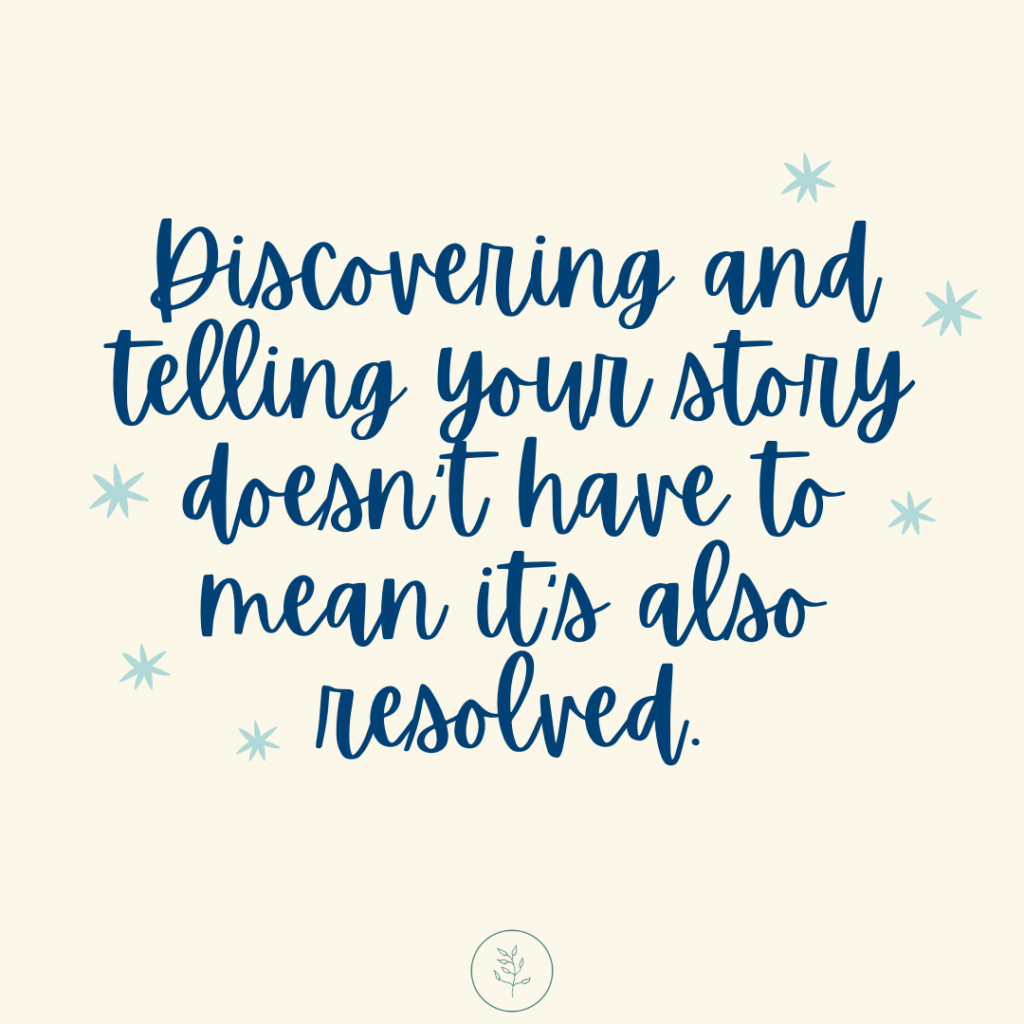
About a few other things…
Do you struggle to create habits that stick? It’s not your fault. The truth is simple: you’ve been trying to form habits using methods designed for perfect robots–not real women living real lives. It’s time to change that. If I could help you gain confidence in creating habits AND guide you to uncover the ONE supportive habit to deeply care for yourself, could you commit 21 days to learning this method? The Sticky Habit Method is a 21-day course that revolutionizes the habit-formation process. It’s real habits for real women.
Sign up for the Go Getter Newsletter to get Progress Pointers in your inbox every Tuesday.
This episode is brought to you by Hatch and HelloFresh
You can listen the episode below, or on Apple Podcasts/iTunes, Spotify, Youtube, Overcast, Stitcher, Pocketcasts, or search for “About Progress” wherever you get your podcasts. If you like the show please share it, subscribe, and leave a review!!
SHOW NOTES
Dan’s Website and Instagram
Finding Me Academy
DSL Guide
Try me FREE Class and check out my NEW Habit Course
Leave a rating and review for the podcast!
Lend your voice and experience + be featured on the show HERE
Join Monica on Facebook and Instagram
Songs Credit: Pleasant Pictures Music Club
TRANSCRIPT
Monica: Dan Davis, welcome to About Progress.
Dan: Thank you for having me.
Monica: This has been something we have both been wanting to do for forever. Now, a big part of that the forever part about why we took so long to finally make this interview happen is, is due to life circumstances and, and some really hard things that you went through.
So I’m sure we’ll touch on that a bit here. But why I have wanted you to be on about progress for years is because of the work you do with Stiry and how it helps the everyday stories be shared in beautiful cinematic ways that I think every person has the right to not just see in others, but also see in themselves.
And you know, the women in my community, I think they struggle with two parts about their stories. We’re gonna be talking a lot about why your story is worth telling today and like how they can tell their more of their story and more often. This is the first part of that I think you’re struggling with the most.
It’s is the, the struggle of, do I even have a story? So I would love to get your insight on that conundrum. Do we each have
a story?
Dan: Yeah, I, I think we live in a world right now where we hear these either really glamorous stories or really tragic stories, and they’re just blown up on, in the media, social media and news outlets and stuff. And so we attach our own story to that and we say, well, I don’t have that level of a story. And the beautiful thing about our stories is there’s no bar that we have to hit to make our stories worthwhile or important.
And so I think it’s just rephrasing the definition of what a story is When somebody says, I don’t have a story. That just means that my story doesn’t reach this invisible bar or this invisible jury that’s out there saying whether or not your story is, is worth telling. And so I, I have found throughout that experience, when people say those phrases, cuz I, I’ve heard that phrase a lot of times I don’t have a story.
Mm-hmm. Or my story’s not good enough to share on Stiry or these other platforms or be open about it on social media or even share it with their friends and family. What I’m hearing is somebody saying, I haven’t gone through the process of discovering my story yet, and I need to discover that, and then I’ll be more comfortable sharing it with the world.
And your, your world might just be your spouse, it could be just your friends. But I think that’s the most important part of that phrase is maybe you haven’t discovered your story yet and the insecurity is not that you don’t have a story, cuz that’s not true cuz we all do. It’s that you haven’t gone through that process yet, and sometimes that’s painstaking.
And so if, if you haven’t gone through that process yet, you’re probably feeling some of that pain with vulnerability and all the other, you know, words that you can think of associated with discovering yourself. You haven’t gone through that yet, so you’re not comfortable sharing that story yet with the world.
Monica: Oh, that’s resonating so much with me. Even though I, you know, I’ve told a version of my story multiple times here. I, I had that same struggle just thinking mine isn’t a sad enough story or dramatic enough, but in the telling, I feel like I’ve discovered it. And I think what you often talk about is it’s kind of the reverse, or, or maybe it’s, it’s both, you know, in discovering, you can tell, in telling, you can discover .How did you initially get into storytelling, why that mattered to you, and then it became your life’s work, helping people tell their stories.
Dan: I have run lots of different types of businesses before I’ve always been an entrepreneur and I thought I would always be in the sports training and, and marketing field.
Mm-hmm. Because that was my background being a competitive basketball athlete, I just thought, this is what I wanna do. This is what I want my life’s work to be related to. And then I did that. I started a company and, and did that and. It got old, and surprisingly it got old and my story started to shift and I was like, oh, well if I’m not meant to do this thing that I had thought of since I was a child, what am I meant to do?
And honestly, just through some divine intervention when I quit that business and sold it to somebody for just enough to go on a trip with my wife it, it was like, okay, I’m, I’m ready and open, and willing to do something else and I’ve gotta provide for my family and I, through that divine intervention, I actually was hired on by a film director to run his business for him.
And I had zero experience in film other than making some commercial ads for my sports training and marketing company. And I thought, this sounds like a really exciting, glamorous, fun, you know, job to be able to run a film production company for this director. And some of that was true, but a lot of it was just commercial work.
And it wasn’t very fulfilling. It wasn’t as creative as I wanted to, to be and, and wanted the company to be. And we were just beholden to these really big clients that we worked with on the east and west coast. We had clients like Verizon and Microsoft and we were doing these, you know, one of the last projects I did was a $400,000 commercial just for a sales conference for Verizon, and I remember just our team working themselves to death.
Through that process of doing this commercial. And I was like, man, we’re really profitable on that project. And you pat yourself on the back and say, we, we did what we were like contracted to do, but then you were left saying, so what? Hmm. I, I just sold more, you know, widgets for Verizon. So what. I’m using this, this skill of run, being able to run businesses profitably for others to sell more widgets.
And I didn’t find the fulfillment I wanted in film, but the interesting thing is, is we were doing a side project, we were doing a feature film that we had complete control over the creative end and the narrative was really good. The script that the director wrote was really good and I started to to love film.
And I started to love the storytelling aspect of it and the technology that you could use to enhance and make these films better and brighter and, and inspire people. But that was only like this small chunk of my time there. And so long story short, I, I was like, I don’t know if I can do this long term after being there for a few years.
And so I left for a while and thought. The commercial film industry left kind of a bad taste in my mouth and I, I didn’t think I was gonna ever do anything with film again. And fast forward to when I started Stiry through some other, you know, divine intervention and things not working out with another job I took as a CEO of a healthcare company.
I decided if I’m getting back into film, I’m gonna use what I learned and my experiences to actually make films that matter. I make a difference. And instead of that small portion of my time being dedicated to that, the entire time that I would spend in my business on film was gonna be dedicated towards helping people, be inspired and find their own story through film.
Monica: Why do you think it matters, not just to you, but to everyone to discover and tell their story? I mean, you’ve dedicated your whole life to this work, so I’m betting you have some pretty profound answers to this, or at least some bigger reasons about why this even matters, this work.
Dan: Well, I mean, I had to go on my own story discovery journey and I wouldn’t be able to help other people unless I went through that process myself.
And the biggest discovery I made, In between being a c e o of this healthcare company and, and starting Stiry I was unemployed trying to figure out what I wanted to do with my life again. And during that time I started to discover my story. I actually had some time to think about what I wanted to do with my life and where I’d been and where I was going.
And if you’re always working or always, you know, in this chaos mode you don’t get a chance to actually sit and think about, you know, your purpose. And I finally sat down and said, my time that I spend in the stillness is gonna be dedicated towards finding my purpose. And that’s it. So I’m not gonna accept a job that doesn’t have to do with my purpose.
I’m not gonna start a company that doesn’t have to do with my purpose. Because once I discover that I’m gonna have the, the internal motivation that that flame that will never go out to go, go live my purpose. And I wanted that so bad cuz I hadn’t found it yet and I was in my early thirties and. What was amazing about that experience is in the stillness I discovered a true principle that anybody can follow, and that’s that.
Your story’s not a list of chronological events. Your story is a combination of all of these perspective moments that you’ve had throughout your life, and that’s your story. A lot of times when people also, like we were talking about earlier, think that they don’t have a story as they’re just looking at these chronological events that happen in their life.
People are not looking at this collection of prospective moments that they’ve had as their story. And once you start doing that, you realize that you’ve had some really powerful experiences everybody has that make up our stories. And once you discover those and you start sharing those, It’s like you get more of those, you get more of those perspective moments, those life-changing moments that help you see the world differently, help you see your own story differently and see the stories of everybody else around you differently.
And that’s where I feel like that flame just never went out for me. Once I discovered that ability, I had to do that with film. I was like, oh my gosh, I can turn that flame on for people through film. And they can have perspective moments through film, their own individual perspective moments and then they can use that to go find their purpose and meaning in life.
And I was like, this is why I got into film years ago is cuz I can use that tool to help people find their purpose in calling in life.
Monica: So what, what did you figure out your purpose was?
Dan: You know, I, I actually found it. I was unemployed at the time and I met somebody that had an incredible story and I asked that person if they had ever shared their story before and he said no.
And it was a story about forgiveness. His wife had passed away in a car accident that he caused, and he had never forgiven himself, you know, from that experience and never really shared that publicly with people. And in that moment when I was talking to him, I had this inspiration to ask him if I could tell his story.
And it kind of caught me off guard and, and I thought it was gonna catch him off guard cuz I hadn’t started a company, I didn’t even know what I was doing with my life being unemployed. And I just said, Hey look, I. You know that I used to be in the film industry. Can I tell your story? And he just immediately said yes.
And I don’t think he knew what he was getting into, but I did. And I knew it was gonna be a big production and big process to do that. But in that moment, I was like, this, this is why I felt so inspired to tell people’s stories. It’s because I have the opportunity to tell this person’s story that’s that’s never been shared before.
I’m giving him an outlet to do that, and I’m gonna take him through this process that will change his life forever. I didn’t know that at the time by asking him, will you share your story? But once I did discover that and took him through the process, it was this intuition that was just inside me, deep inside me that came out to guide him through that process.
And all of a sudden I watched him start to forgive himself. I watched him be empowered by his story being released and that freedom that came from that. And then all of a sudden the freedom came for me because I was helping someone else do that. Yeah. And I just, it became an addiction where I was like, I just wanna help more and more people.
Maybe addiction’s the wrong word, but I was super motivated to help more more people do that same thing that this gentleman. You know, the same experience that he had and I, I watched the freedom that came from that, and if I could do that for other people, I was gonna stop at nothing to do that.
And that’s what you’ve been doing through Stiry.
Monica: And you know, I wanna go back to something you brought up earlier. You brought up perspective moments. Let’s, let’s go to that. And we’re thinking about the, the listeners here who are trying to figure out what a perspective moment is and how they can pinpoint those in their lives and how that builds up to a, a greater story in, in a sense for them.
Dan: Yeah, I, I coined that term early on because I needed a word for something more powerful than just a light bulb or, you know, an epiphany that came to you. Cuz I think we have lots of light bulb moments and epiphanies and stuff, but perspective moments are really just those experiences you have in your life that shift the way that you see your story mm-hmm. And those stories around you. And when you have a perspective moment sometimes we miss those. We, we just move on. We have this great moment, and then we move on to whatever’s next in our life.
And what I discovered while I was unemployed is if you actually sit down and, and write those perspective moments down and dig into them and figure out what they mean. Then suddenly they become meaningful and you’re starting to write the script for your own story. And I just never did that before. And I think most people don’t do that.
And they just gloss over those perspective moments and they don’t change them as much as they could if they were to, to actually hone in on those experiences.
Monica: So let’s, let’s talk about a perspective moment that you were able to pick up on for yourself during this period of time when you were realizing, oh, I do actually have a story, what were some perspective moments for you?
Dan: For me, I had always been an entrepreneur, like I told you, and, and I had bounced around to these different entrepreneurial activities or businesses that I was running and. Never knew why I was meant to, to run my own business and, and create something, and I was just drawn to it, but didn’t know the purpose behind it.
And honestly, the biggest perspective moment for me was when I got that job running that film production company I was there to learn because it was gonna pay off later. I was there to gain an experience so I could do it myself. Hmm. And I wasn’t meant to be there forever. And sometimes I think with these experiences that we fall in love with, the idea of, of this experience or this thing, or job or role that we have in our lives lasting forever.
And now I don’t see experiences that way. My perspective moment during that time was those are all stepping stones to something much bigger and even Stiry and, and what I’m doing right now is a stepping stone to probably something so much bigger. And not every, any, and not anything is permanent. Right?
Yeah. And so if you can start to see your journey like that, then you start to see these perspective moments and these experiences as just that. Stepping stone to the next greater thing. And that’s what happened for me. It just turned into this thing that feels like I, I am complete now. And maybe it won’t feel like that in five years from now, but that’s okay.
Right now, I’m exactly where I’m supposed to be.
Monica: I’m so glad that you, you framed it that way. We’ve talked a lot about purpose on this show over the years because that’s one of the big desires that women have in this community is to have a sense of purpose. And one thing that I’ve taught and I’ve learned from other people like you is it’s not about having a one definable purpose.
It’s a deeper kind of, even more general thing for you. It’s, it’s, Telling stories and it’s helping people tell their stories, but there’s probably like a nugget to that too that can carry you for whatever these stepping stones are, including story one day. I wanna give them some tangible things that they can do.
So we kind of talked about perspective moments and maybe you have some advice on how to collect those or maybe it’s just having some stillness like you, you accidentally had during that time of unemployment. How can they start to learn how to discover their story a little more and also start to tell it more.
And again, that might be a chicken and the egg kind of question I’m asking you.
Dan: Yeah, I, I think the first step is to just recognize that it’s okay to be where you’re at currently in your story. I think we as humans think that, We can build a plan in our heads, and if the plan doesn’t go according to plan, then there must be something that’s off or wrong about our story, about our journey.
And so I think the first thing to do is just to set that aside for now and just say, okay, I’m gonna figure out what I’m meant to do right now. Not what I’m meant to do the rest of my life, and if I can figure out what I’m meant to do right now, then I can be open to all of these perspective moments that will tell me that you can start to reflect on these experiences that you’ve had and as you start to write them down.
It’s like, I call ’em downloads. It’s like your, your computer all of a sudden starts to download all these, these things and your, your mind, your inspiration. I believe it’s God and, and everyone, you know has their own way of interpreting that. But for me, I, I felt like God gave me all of these downloads and as soon as I started writing more of ’em came.
Hmm. And those perspective moments started to get really obvious. And once I started to practice that more and more and more, I got more and more. Hmm. And it started to direct me to my purpose and my, what I was meant to do for that moment. And so I think the stillness is really important to set aside any preconceived plans that you had for your life and be open.
And then the third thing would be just start writing. Hmm. Just start writing about these experiences that you’ve had and what you’ve gained from them. And all of a sudden those experiences are matched with what you gained from them. And it starts to become a perspective moment. And then all of a sudden you’re like, oh, this is my story and it’s gonna be different than everybody else’s.
And that’s what’s great about it. Is all those answers that you get, ah, I learned this from that, I learned this from that. Oh, this is why I ended up here. And you start to just connect those dots and what you’re weaving is, is a beautiful story and it’s unique to you. And that’s the process I would, I would invite people to take.
Monica: What about the telling piece can come at play here because, In our day and age, a lot of what we think counts is if it’s public and that matters. I mean, you and I are both doing that version of it in one way or another. But for the people who get stuck on that point thinking that it has to be only look a certain way, like I have to share my story on Instagram or develop a business around it.
What would you say about that telling piece of the puzzle?
Dan: Yeah. Telling or sharing your story can be as simple as. Putting a perspective moment on your fridge to remind yourself of how important you are and the experiences that you’ve had. It could be a quote from your own journal, you know? Yeah. That you just put on your mirror.
It could be telling your kid about an experience or a perspective moment that you had. That’s enough. I, I think we do think that we have to just blast it from the rooftops and maybe. Now is not the time for you to do that. Maybe you’re not ready to blast those parts of your story from the rooftops, but there is somebody in your life, even if it’s just you that needs to hear that story.
And so maybe you need to just tell your yourself, your story and tell it back to yourself, if that makes sense. Maybe it is a child, maybe it is a spouse, maybe it is a friend. Someone needs to hear your story. And if you have to start with you, that’s okay. Start there. And then you’ll watch that you, as you become more comfortable with your story, you can start to impart parts of your story that are gonna really, really help somebody else.
And if you start to do that, it becomes a healthy, very healthy process. And you start to see the benefits of letting others in. And I always call it relief from relating. Hmm. Once you start to have that relief, you’re like, oh my gosh. There’s other people that have gone through what I’ve gone through, and you start to have more and more relief and it just brings a peace that, that I’m convinced can’t come from anything else.
And that has to do with for sure, just being okay and vulnerable with yourself first, and then going outward.
Monica: In addition to that peace part, I think it’s back to the purpose that you brought up earlier. Even if you’re just telling it to yourself or to those in your family, your friends, it gives the struggle a sense of purpose, not only from the past, but what you’re currently going through.
And I know that is something you have a lot of experience with and I’m sure. Unfortunately you’ve had to, to test this out in many ways at the last few years, especially you’ve gone through some major health battles where you were fighting for your life and if you were willing to just share a little bit about that as well as how seeing this, you know, the different parts that you were going through there, how they were stepping stones to a greater part of your story, lended you some purpose to move through it in a way that you could move through it better, or at least in a way where you can now like look back and be more proud of that you were able to do that
for yourself.
Dan: Yeah. I, it’s kind of funny, I, we kind of joke about it in, in story that we’re the storytelling company, but Dan wasn’t sharing a part of his story with, with anyone.
Mm-hmm. And I was suffering in silence for a really long time and I used the excuse for a really long time that I didn’t know what to call it. Yeah, and that’s because my health scenario and, and my case didn’t have a name yet. And so I, I thought, well, it’s not deserving of, of being told until I figure out what I have.
And I went undiagnosed since I was, the earliest time I can remember symptoms is 10 years old and I’m 37 now. And until a few years ago, I didn’t know what to call my health struggle. And so I just kept it to myself. I just battled every day, didn’t show signs of, of what I thought were weakness, and I just grinded it out thinking that someday this’ll be fixed.
And, and it’s not now. And what’s interesting is Once I started to open up and share about what I was going through and that struggle, I was, I was concerned that people would run and say, oh, this is too heavy for me to carry. We don’t know what you have, so we don’t know how to support you. I just made up all these lies in my head of why I shouldn’t share that with people.
And one of them too was I was worried that the people that hired us to do these videos and tell their stories would think we weren’t capable anymore because the, the leader, the visionary, was not well, and it was actually opposite what happened. I started to share it and people just came running to me.
And it was like they were just, they were ready to support and I was the only one keeping them from supporting me. And I think it was a valuable lesson for anybody that’s struggling with mental health, physical health, I’ve, I’ve crossed those two ts very well mm-hmm. Over the last several years with my, my physical health and the mental health struggles.
And as soon as I opened up about those things, I realized there were people in my inner circle that had similar things. I realized there was this outer circle of people that were willing to help and support me and get answers. And ultimately, by me opening up about my story, that’s what got my diagnosis.
So I was actually keeping myself from being healed completely because I was keeping it to myself.
Monica: I did not know that last piece there. That’s incredible. And I, and I want to direct them to your Instagram where you have shared so much you know, the past couple years, especially when you had the lowest of lows and both of those ts that were crossed for you, both mentally and, and physically, so that they can learn from you and, and see what your story was there and how it’s still playing into today.
Can, can you make that connection for us? How is that playing into what your story is right now and where you’re at?
Dan: Yeah, I, I started, it was about, Maybe two and a half years ago, I posted my first really vulnerable post about what was going on with my health on my Instagram account. It’s at Stiry Dan.
And with a lot of like anxiety about doing that Sure. And getting it out there. And as a result, that’s, that’s what happened. All these people came running to me and, and what you may not know it sounds like is that that was my first step. And then one of the second steps was I opened up about my story to this doctor I was interviewing.
Mm-hmm. And that’s the one I do know about. Yeah. You might know that connection. That’s where I got my diagnosis. I was interviewing this doctor for Kim White’s film and most people know her is Kim can kick it. And I just half jokingly said, Hey, you should try to figure me out. I’m a medical mystery.
And she got this really stern look on her face and she said, what’s going on? And this is during this like 10 minute break in the middle of filming. And I listed off all of my symptoms and she started to just list off. She said, I think you have Nutcracker syndrome, may Thurner syndrome, thoracic outlet syndrome.
And she just listed off seven or eight diagnoses and I was like, I’ve never heard of these before. I have no idea what you’re talking about. It was just gibberish to me. And that night she said, if you don’t mind, I’ll look at your scans. Because she was in my healthcare system and she just needed my name and birthdate and she found me and she looked at my scans that I had had for years and said, you have Nutcracker Syndrome, this problem with your kidney.
And I was like, no way. Like, no way. Wow. That she figured that out, that fast. And then within the next 12 months, I was diagnosed with essentially every single syndrome that she listed that day. And it just goes to show you that, that for me, my sharing of my story actually saved my life physically. Mm-hmm.
Mm-hmm. But in so many ways over the years, it’s, it’s saved my life mentally, spiritually, emotionally, because it, his, like I was saying with Nathan, that first story that we ever shared, he was free. Once he shared that and got it out there, I, I felt the same way. Once I actually released this pain and sorrow and conflict and struggle that was inside me, my story suddenly mattered more and I was free. It was out there and all of a sudden, all of these people were coming to my rescue and supporting me in my journey that we’re just, like I said earlier, waiting to do that. And if you’re not willing to share your story, how can we expect people to read? A book that’s never been written for them to see and for them to read, they can’t help you unless you open that part of your life up.
Monica: What’s so striking to me is that discovering and telling your story doesn’t have to mean it’s also resolved. We’re, we’re in the messy part of it. We’re, we’re living it out. We’re building the story as we go too. But in the discovering of it and the telling of it, we don’t have to totally have resolution in order to have that sense of purpose and peace that you talked about and the relief that can come in
Dan: a hundred percent.
It’s painful. Yeah, I, I mean, just really quick, I. At my darkest moments where I wasn’t sure if I was gonna make it, we had these really scary operations that I’ve had to do the last couple of years and months and months of physical therapy and, and rehab. And in my darkest moments where I could just, I had to decide if I was gonna sit in bed and physically let this take me and mentally let this destroy me.
I had stir. To lean on. I had telling other people’s stories to lean on and I had sharing my own story at that point to lean on as well. And having that purpose I thought was just to tell other people’s stories when I first started story. And that purpose of telling my story and other people’s stories actually got me outta bed every single day.
Every day. And we think that our stories don’t matter and they’re not worth sharing. I can just tell you from personal experience that that’s what kept me alive, literally. And then mentally and emotionally and spiritually kept me recharged to where I had this, this, the only way I can describe it is just this flame inside of me that never went out, even when I was having conversations with my wife about what would happen if I didn’t make it, even when I was listening to my boy Pray at night asking God to save his dad. Hmm. When I didn’t even know he knew that that was a risk of what we were, what we were dealing with. And I was only able to get through those days because I had that fire. And, and I’m just so grateful that I had that perspective moment to open up about my story. I had those perspective moments that led me to start my company because it was the very thing that that saved my life. And I’m just so, so grateful. There’s no words that those perspective moments were put together in a way that, that did that for me. And I think it can do that for other people. I know it can.
Monica: Oh, I have chills. Top to bottom chills, Dan, that fire you had inside you, I got to bear witness to that on Instagram. Thank you for being so open and for sharing there. But I also got to see it in through your work with Kim White’s documentary that was recently part of a film, film festival locally that I was able to see it. And that fire was just so throughout her own fire, you know, her and also yours, your passion to tell her story.
Kim was on the podcast years ago, and I know that some listeners are familiar with her story, both from the podcast episode and of course, what she did online to let people in on her story to lend purpose to her immense suffering too. I would just love to know. Just from your perspective, what about all that we’ve talked about today, went into telling Kim’s story in this way.
Dan: Well, first of all, I gotta thank you for that podcast you did with her, because as you noticed it was in the film. We put a piece of that in there and Kim was just, she was unafraid of sharing. The most vulnerable parts of her story and she let people in in a way that is now a little more commonplace.
But I think she was a pioneer in that in her time. And she never set out to become some big influencer or something. She just was being true to herself. And she discovered the power of, of being a, freeing your story. And she, she. Got used to that, and she loved that power and, and it gave her so much in her fight, and I got to witness that firsthand.
I got to be there for some of the most devastating moments of her journey and some of the happiest and most triumphal parts of her journey. And I can just, I can just tell you that like through this film, we just can’t wait for everybody to see it because we captured those moments and they’re, they’re now, the world’s gonna be able to see that.
And in those moments, you just feel lucky to be there and to see those moments firsthand. And I think that’s what I, I learned from that experience is that when someone trusts you with those, Just precious moments of their story and allows you to capture those in film and then show other people the amount of power that it’s like it comes in the camera and then goes out on TV or on people’s phones.
It’s just this like visible light that we’re capturing that gets to be projected out to the world. And Kim was so good at letting that light out. So good at doing that. And we got to be that. I was gonna say fly on the wall, but we’re not very fly on the wall with our crews and stuff, but fly on the face.
Yeah, exactly. But we got to be there in those vulnerable moments and just reflect the light out and, and capture those things that. That no one’s ever seen in this part of a cancer journey. These parts of motherhood that people haven’t seen. And I just felt like we were part of, of really making history and part of something that was, that was so special that I’m like, ah, am I ever gonna be able to replicate that experience?
And then we do more and more films and I’m like, we get to do this every day. Yeah. And I’m, I’m making it sound easy. It’s not easy, but. But because we have purpose and meaning with how we’re doing that with Kim and all these other stories, it’s just this honor and privilege to, to help people make sure that they know that their story matters.
Monica: Thank you for being willing to, to go there about Kim’s documentary, because one of the biggest things I took away from watching it was that light piece for sure, but as part of it, how light could include anger, and devastation and frustration and sadness. That’s what I loved so much about it, is seeing the humanness in her fight and how it showed me I can fight my battles and be messy too, that it doesn’t mean I have to do it perfectly to do it well and to do it in a worthy way.
That’s what I learned from that.
Dan: Oh, I’m so that makes my heart just so full because when we were deciding what to call her film, which is no small feat, when you are dealing with somebody’s, you know, story, especially Kim and her vibrant personality, you wanted to capture all of that in the name of the film.
And that’s why we called it Breaking Into Beautiful is because you break so many times to become a beautiful human. And you’re gonna continue to break. And Kim made sure that, that people knew that this was a process, not a one-time event. And you watched Kim, like, there, there is just something that people saw in her eyes, in her presence that was just powerful, beautiful.
And it had nothing to do with, with physical beauty. It had everything to do with, here’s a woman that has a purpose, and she is letting that out. And it’s going right through her eyes into your soul. And she’s making sure that everybody understands that we all have messy, messy lives, but it can be really beautiful. And that’s coming from somebody that had some really messy, difficult stuff happened to her.
Monica: I know people are anxious to see the film and you’re working so hard on distribution, so where should they go if they wanna be in the know for when it’s ready to be viewed by the public?
Dan: Yeah, you can actually go on stiry.com and you can sign up to be updated with all the updates on our film.
We’re gonna be sending out an announcement about what happened at the film festival and the awards that we won there and what’s next for the film. So that’s the best place to go to be updated and we’ll just keep you posted. We’re as anxious as anybody to get this film out to the world, and we’re doing it the right way.
We’re making sure that it can be seen by millions and millions of people. And so we’re, we’re going about it that way to, to make sure that everybody can, in the comforts of their own homes can, can be a part of breaking into beautiful. And we’re really excited for people to have that in their hands.
Monica: Well, I can’t wait for that. And I also want them to be able to follow along with your work because like you said, this is not the only story you have told. There are hundreds. If they want to see more of your work, where should they go?
Dan: Yeah, so once again, stir dot com’s a great place cuz you can sign up for our email list and you’ll get stories delivered right to your phone.
And then you can follow us on App Stir, s t i r y. It stands for stories that Stir. I didn’t clarify that in the very beginning, but that’s another great place to go where we update everybody on everything that we’re doing. You can see behind the scenes of all of our films and, and all the projects we’re working on right now.
Monica: Now before we go, Dan, I always ask this for my final question, what is one small thing listeners can do to get started on everything we discussed today?
Dan: Just sit in the stillness and find just one perspective moment that you’ve had in your life that changed the way that you saw your story and people’s stories around you.
And if you can do that, I, I believe that’s the spark that you’ll need to discover more of those perspective moments that will make up that really powerful story that you have.
Monica: Dan, this was worth the wait, at least on my end. Thank you so much. No, this, you bet. This is already going down as a favorite.
It’s meant so much to me. Thank you for being here and for helping the listeners in this community embrace that they even have a story worth telling. I think we’ve all needed that. Thank you.
Thank you for having me. It’s been a pleasure.
